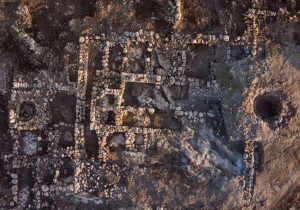A well-preserved 2,800-year-old farmhouse that dates back to the 8th century BC was excavated by the Antiquities Authority in Rosh Ha’ayin, central Israel, on Monday. The farmhouse, built during the time of the Assyrian conquest, has 23 rooms and extends across an area of 30 meters by 40 meters.
The building was used during the Persian period, known as the time of Return to Zion, in the 6th century and in the Hellenistic period that began with the arrival of Alexander the Great. Evidence of a Greek presence in the region was uncovered when a rare silver coin bearing the warrior king’s name was found on one of the floors. One side of the coin shows the god Zeus and the head of Heracles is on the other side.
“With Alexander’s victory over the Persian army in 333 B.C., he embarked upon numerous successful military campains,” says the site’s excavation director Amit Shadman. “His campaign in Israel did not encounter any special difficulties and the country opened its gates to the great warrior.”
Regarding the farmhouse, Mr. Shadman said that these type of buildings were small settlements. Numerous winepresses were discovered in the area showing that the wine industry was the most important branch of agriculture in the region.
Ask me anything
Explore related questions






